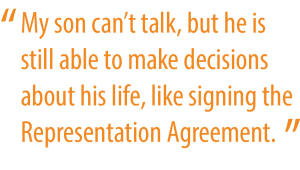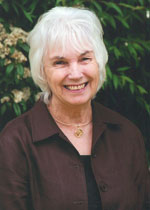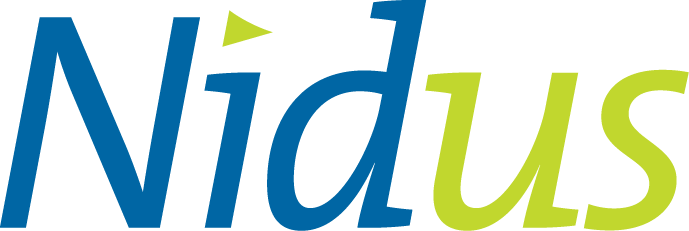Drew's Story
 When Drew Dickey signed his Representation Agreement, his mother, Jo, hosted a “signing party” complete with champagne and chocolate cake. With the representatives and witnesses present, Drew’s support staff gave him the pen for signing. Taking charge, Drew transferred the pen from his right hand to his left and put his mark on the Agreement. (His support staff did not realize that Drew is left-handed.)
When Drew Dickey signed his Representation Agreement, his mother, Jo, hosted a “signing party” complete with champagne and chocolate cake. With the representatives and witnesses present, Drew’s support staff gave him the pen for signing. Taking charge, Drew transferred the pen from his right hand to his left and put his mark on the Agreement. (His support staff did not realize that Drew is left-handed.)
Drew’s deliberate action surprised even his mother who believed he was capable but also knew that, because Drew did not communicate in a traditional way, others did not believe it. Being labeled with a developmental disability meant Drew had never had opportunities to sign important documents for himself. There was some uncertainty about whether Drew would know what to do.
The signing of the Representation Agreement was also a celebration of the community effort to create a legal alternative to guardianship. For Jo Dickey, who was involved in the law reform for over 20 years, it is about Drew’s right to have help from those he knows and trusts. “My son can’t talk, but he is still able to make decisions about his life, like signing the Representation Agreement.”
While working on the new law, Drew’s family discovered that the Public Trustee was legal guardian of his finances through a procedure called “Certification of Incapability.”
Living in Woodlands had automatically made Drew a ‘ward’ of the government. When the institution closed, no letter of discharge was issued. With the help of his family and the cooperation of the Public Trustee and the Ministry of Children and Families, Drew was able to locate and have the Certificate of Incapability discharged. Now the long forgotten and once effective Certificate, sitting in the files of the Office of the Public Guardian and Trustee, cannot conflict with the Representation Agreement, which ensures Drew will have assistance to make his own decisions.
 Certificates of Incapability are still issued today by designated health professionals. These result in the Public Guardian and Trustee having automatic authority to take over the person’s affairs and can also cancel an existing Power of Attorney. This may affect people with a mental illness or dementia (such as Alzheimer’s disease) when they are admitted to hospital. Sometimes it also affects those living in the community when assessed through the mental health unit.
Certificates of Incapability are still issued today by designated health professionals. These result in the Public Guardian and Trustee having automatic authority to take over the person’s affairs and can also cancel an existing Power of Attorney. This may affect people with a mental illness or dementia (such as Alzheimer’s disease) when they are admitted to hospital. Sometimes it also affects those living in the community when assessed through the mental health unit.
The good news is that Representation Agreements with section 7 standard powers are a legal alternative for people who need some assistance. It ensures they get help from supporters they trust and who know them; without losing their decision making rights. Because a Certificate is difficult to discharge, it is important that people have the option to make Representation Agreements as a first resort!
A Mother’s Dream Come True
The following is reprinted from Transition Magazine which is published by the BC Coalition of People with Disabilities. The article was written by Hilda Thomas and was called ‘How do we thank thee…’ in honour of the community’s involvement in the reform of adult guardianship legislation. Jo Dickey was one of the community leaders featured in the article.
 Good things don’t just happen. It takes many people working together to make them happen.
Good things don’t just happen. It takes many people working together to make them happen.
And they don’t happen overnight. It takes months, years, and sometimes decades of effort to bring about changes in the institutional and social attitudes that affect people’s lives.
As a parent of a child with brain damage, Jo Dickey learned early on that families had no status in making decisions about their children’s care, and that people with mental or intellectual disabilities had no rights at all. She became active in the movement in the early 80s to change that.
For Jo, it is a question of rights. “It is the difference between making decisions for people, and allowing them to make their own choices. My son can’t talk,” says Jo, “but he is still able to make decisions about his life. It’s especially important for seniors, and people like my son who can’t speak for themselves, that they be represented by someone who has knowledge of them, and who they can trust.” A Representation Agreement is just that – a support system.
For Jo, it is the culmination of a twenty-five-year fight for rights, and the fulfillment of “a personal dream.”
SIGN UP FOR NEWSLETTER
Stay updated on the latest developments, resources, and more.
© 2025 Nidus Personal Planning Resource Centre. All rights reserved.

